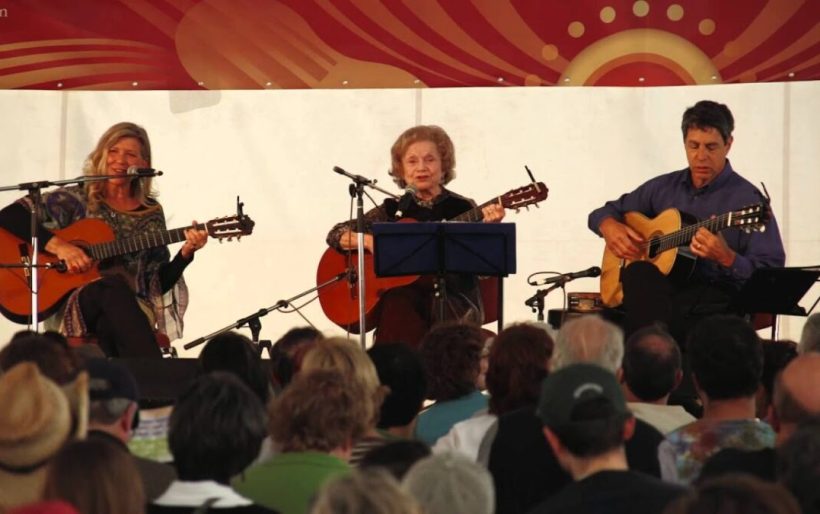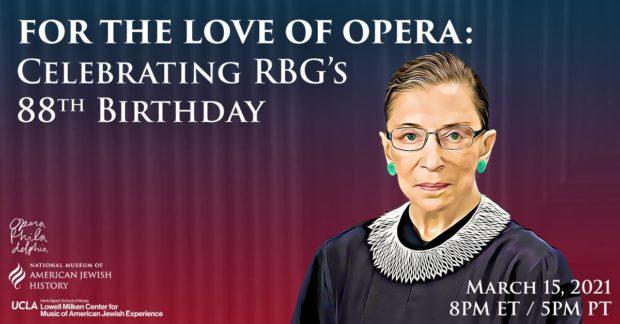Keep The Fire Lit: How the National Museum of American Jewish History has made music a cornerstone of its pandemic programming

Flory Jagoda | still from video
In February of last year Dan Samuels had his first day on the job as the new Public Programs Manager at the National Museum of American Jewish History at 5th and Market. He and his wife Hannah had just moved to Philadelphia from Baltimore six months prior and Samuels was very excited to start working on all sorts of programming at the National Museum of American Jewish History, from movie screenings to cooking demonstrations to concerts. A bit more than a month later, with the COVID-19 pandemic raging across the world, the museum closed its doors to the public. Samuels was not able to put on even one event during that time.
Like so many other people in the arts and music scenes, he had to figure out what to do next. “We all entered into this pandemic together,” he told The Key. “When I say ‘we’ I don’t just mean the rest of the museum and me. I mean the whole world. And we’re all trying to figure it out together. Every one of our jobs has shifted in one way or the other.”
It took some time to both readjust and in some ways reboot but by April they had switched to a calendar of virtual events. That month the NMAJH hosted the Passover Freedom Seder, “an evening of commemoration, stories, performances, and a community exploration of freedom in America today.” Put together in-collaboration with First Person Arts and the African American Museum in Philadelphia, this was the eighth annual Freedom Seder but the first to be online. As they wrote on the invitation, riffing on the line from the Passover ritual: “This year: over the internet, l’shana ha’ba’ah – next year: in person!”
Samuels said that at the museum they’re using “every element at our disposal” including live video, pre-recorded shows, photos, audio, interviews, and discussions. “We’ve done our damnedest to get the audience engaged” with everything they’re doing, he explained. That engagement can be seen quite clearly on the Facebook and Zoom chat during their events with people tuning in from around the world who are quite excited to share their thoughts and interact with each other and the performers. As Samuels told The Key: “Music…has that power to really transport us. And when we’re all stuck at home that power is really important.”
One of the more popular webcasts they’ve done was a 97th birthday celebration for the musician Flory Jagoda in late December. Jagoda, who sadly passed away a few weeks later, was a Ladino musician – the Spanish-derived language spoke by Sephardic Jews who originated in Spain – born in Bosnia in 1923. She left Sarajevo in 1941 for Split and eventually ended up in the United States five years later. An accomplished musician since she was a child, Jagoda brought the songs of her family, of her culture, to a much greater audience. Her most well-known song is “Ocho Kandelikas” (Eight Candles), a Hanukkah tune written in 1983 that’s been covered by numerous bands.
Jagoda was called the “The Keeper of the Flame” for her work to preserve Sephardic culture. Samuels said that at the museum they would “keep the fire lit” to honor her memory and introduce her to future generations. “Her music is forever,” he explained. “The way she touched people and the way her music touched people, it’s all incredible.”
He pointed out that a musician like Jagoda fits perfectly into the museum’s mission of creating “educational programs and experiences that preserve, explore, and celebrate the history of Jews in America.” Before the pandemic the NMAJH, a Smithsonian affiliate that was built in 2010, hosted close to 100,000 people a year.
Samuels’ own musical background is in folk and funk. He’s a longtime touring drummer and was a regular in the Baltimore and Washington, D.C. scenes both as a musician and concert promoter. He grew up in Bucks County and has been volunteering at the Philadelphia Folk Festival since 2004 and even played there in 2016 with a band called Bumper Jacksons. This past year he was part of the committee that helped figure out how to shift that festival to a virtual format, no doubt using the expertise he gained from dealing with those same issues at the museum.
When he was organizing shows in Baltimore he felt that his job, especially as an outsider to the city, was “not to climb over other people on a ladder but to try and lift the community together.” That idea, he told The Key, is something that he brought with him to Philadelphia and the NMAJH.
One of the new projects that Samuels has started since arriving at the museum is Songs of Our People, Songs of Our Neighbors, a performance and interview series which, according to the website, has as its goal the exploration of “music from varied Jewish traditions and diverse cultures, from the historic and traditional to the contemporary and reimagined.” The first person profiled was Yosef Goldman, a Philadelphia rabbi and singer-songwriter who in 2019 was selected for a jazz residency at the Kimmel Center alongside trombonist Dan Blacksberg.
Samuels noted that the name of Goldman’s recent album, Open My Heart, is a great way to describe what they’re going for in this series. As he put it: “That’s what this programming should be doing for all of us, whether we’re super familiar with what we’re about to listen to or whether it’s the first time.”
That album was released by Rising Song Music, a division of the Rising Song Institute, a local Jewish music organization that’s in partnership with the museum. You can read more about them and their mission of becoming “a meeting place and incubator for creative musicians and prayer leaders who hope to reinvent the future of music as a communal Jewish spiritual practice” on their website.

Other series participants include Joey Weisenberg, who along with Goldman co-directs Rising Song, musician and Jewish educator Deborah Sacks Mintz, roots reggae artist Clinton Fearon from legendary Kingston band The Gladiators, and modern Ladino singer and pianist Nani Noam Vazana. All of the interviews are done virtually through Zoom, something that has really made so much of the programming during quarantine a working reality by putting everyone in the same room no matter if they live around the corner or halfway across the globe.
While most of the performers have Jewish religious and ethnic backgrounds, Fearon comes from the Rastafarian tradition that brought together faith and politics in 1930’s Jamaica. That movement, with its use of imagery and allegory from the Old Testament, featured prominently in reggae music, a style that developed on the island three decades later. While Rastafari is obviously not totally analogous to Judaism, there are a lot of commonalities. “We talked about the shared lineage of Solomon and David and about music from nature,” Samuels told The Key. You can view that program in the online NMAJH archives.
One of the things that Samuels is trying to do with all the music programming is expand the audience’s definition of what’s considered to be Jewish music. Judaism is not religiously monolithic and neither is its cultural traditions. So while many might only think of klezmer – a style of music from the Ashkenazi Jews of Central and Eastern Europe – there’s actually a lot more than that. In fact even within that tradition there’s a lot of variance.
To that end he’s also organized programs about Middle Eastern and North African Jewish musical traditions, including a performance by Syrian oud player Asher Shasho Levy, and a panel discussion on the topic of the “lesser-known musical styles of Jewish America” like Yiddish opera, Orthodox bluegrass, and Persian Jewish songs.
While he doesn’t know what the future looks like, Samuels keeps plugging away at the virtual programming with the hope for mass vaccinations and that everyone will be back in the building soon. “[There’s] a lot of big plans for when we’re in person again but for now I’m happy with what we’re doing digitally and we’ll trek on until then,” he said. When that day finally comes and he’s able to run an event for a live audience at the museum “it’ll be monumental.”

The next musical event the NMAJH is hosting is an opera-themed birthday celebration for the late Jewish-American Supreme Court Justice Ruth Bader Ginsburg on the 15th of March. That program will feature some of Ginsburg’s favorite arias sung by performers from Opera Philadelphia. You can read more about it on the museum’s Facebook page.